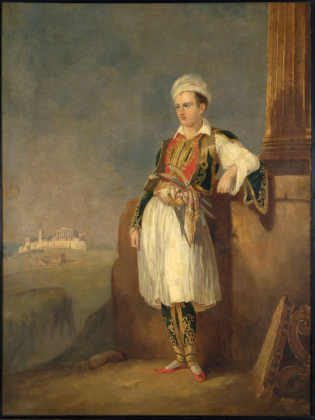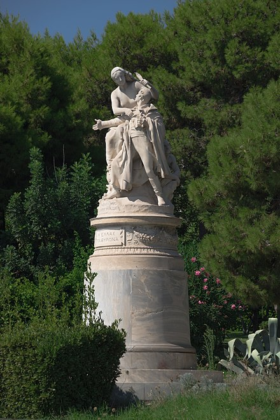Lord Byron’s Epic Heroism and his Role in the Greek War of Independence
by Anastasia Kaliabakos
April 19, 2023 marks T-1 year until the bicentennial of the famous poet Lord Byron’s death. Before doing any research into Lord Byron, I only vaguely remembered learning about him from English classes in high school and the dramatic reading of his poem “She Walks in Beauty” from the movie Dead Poets Society. However, he is more interesting, in my mind, than nearly any other modern poet due to his exotic and epic travels throughout his youth and young adulthood.
Byron was born in Aberdeen, Scotland, in 1788. He did not have an easy early childhood, as he suffered from clubfoot and lack of wealth. However, his life changed for the better at age ten, when he inherited the title of his great uncle, William, the fifth Baron Byron– hence, Lord Byron. He was able to attend various elite and selective schools, such as Harrow and Trinity College, Cambridge. However, while he was honing his artistic craft and gaining knowledge from his high-level schooling curricula, he was acquiring a lot of debt and embroiling himself in dramatic and passionate relationships with a variety of partners– arguably, fuel for future poems. In 1807, he published his first volume of poetry, entitled Hours of Idleness, which was not received well by critics.

Portrait of Lord Byron, artist unknown
After he obtained his master’s degree in 1809, Byron traveled in Portugal, Spain, and the Near East for two years. Traveling abroad in your young adulthood was customary for rich men at the time, as it would increase their worldliness and sophistication. His experiences fed into his later works, including Childe Harold’s Pilgrimage (1812), which he began writing during his travels in Greece. This particular epic brought him nearly instant fame in England. Upon his quick rise to fame, it is said that he exclaimed that he “awoke one morning and found myself famous.” Afterwards, his poetry, style, and manners were widely imitated by others who sought to be like him.
In 1815, he married Anne Isabella Milbanke, and the couple had a daughter, August Ada, in 1816. Ada proved to be a mathematical prodigy and is actually considered to be the first computer programmer. However, Byron’s marriage quickly failed and they were legally separated. Afterwards, he traveled to Geneva from England as a social exile, settling down near Bysshe Shelley and his wife, Mary Wollstonecraft Shelley, both famous authors. He continued to explore romantic options abroad for the next few years and worked on his writing simultaneously.
In 1821, the Greek War of Independence began. It was a successful war fought by Greek revolutionaries against the Ottoman Empire. In 1826, the Greeks were assisted by the British Empire, the Kingdom of France, and the Russian Empire, while the Ottomans were aided by their North African allies. The war led to the formation of modern Greece, which would be expanded to include its modern borders in later years. The revolution is celebrated by Greeks around the world as independence day on March 25th every year.

The Reception of Lord Byron at Missolonghi (1861) by Theodoros Vryzakis
Byron, who was known as an avid supporter of liberal causes (having participated in an uprising in Ravenna, Italy years prior and engaging in liberal dialogue in the House of Lords when in England), supported the Greeks in their fight. He decided to join the Greeks, sending £4,000 of his own money to prepare a Greek fleet for sea service and then sailed on December 29, 1823 to join Prince Aléxandros Mavrokordátos in Kefalonia, who was the leader of the rebelling forces in western Greece.
Additionally, a separate rebellion was being spearheaded by Mavrokordátos in Missolonghi, which is a town on the northern coast of the Gulf of Corinth. The campaign there was fractured among the Greeks due to tension among the leaders there. However, Byron made immense efforts to unite the factions and even personally took command of a brigade of Suliote soldiers, who had a reputation of being the bravest among the Greeks. Byron wrote in his journal, “I came here to join a nation, not a faction.” And that he did. During his time in Greece, Byron set aside his previously hedonistic-leaning lifestyle to be a true military leader. In the face of factionalism and military ineptitude, Byron came into his own as a Spartan-like leader, training his troops valiantly and subsidizing the Greek cause despite being a foreigner.
In 1824, his unwavering commitment to the war caught up with him. Weakened by a serious illness, he insisted on training strenuously alongside his undisciplined men in the cold, wet March weather in anticipation of an assault on the Turkish stronghold of Lepanto. Unfortunately, Byron contracted malaria and died on April 19, 1824. His body was brought back to England. Although he was refused burial in Westminster Abbey due to the reputation he acquired in his younger years, he was placed in his family vault near Newstead.

Statue of Lord Byron in Athens
In 1829, Turkey accepted the Treaty of Adrianople, which recognized Greek autonomy. During the 19th and early 20th centuries, the Greeks continued to fight to expand their boundaries to include the Greek-speaking population of the Ottoman Empire, eventually reaching what is the present territorial configuration in 1947.
Byron said on his deathbed, “Die I must. Its loss I do not lament; for to terminate my wearisome existence I came to Greece. My wealth, my abilities, I devoted to her cause. Well, there is my life to her.” Today, nearly every Greek town has its Odos Vyronos, or Byron Street, and statues memorializing the British expat are common. I am sure that Byron would be happy to know that his legacy is not only carried on eternally through his poetry, but by the Greeks today who continue to admire his dedication to Greek independence. This Greek Independence Day, be sure to remember not just the Greek warriors, but also all the foreign volunteers and fighters, who earned Greece her long-deserved freedom.















0 comments